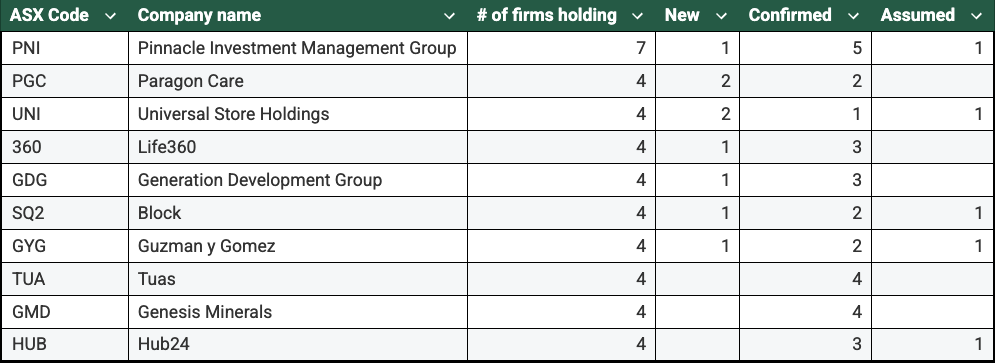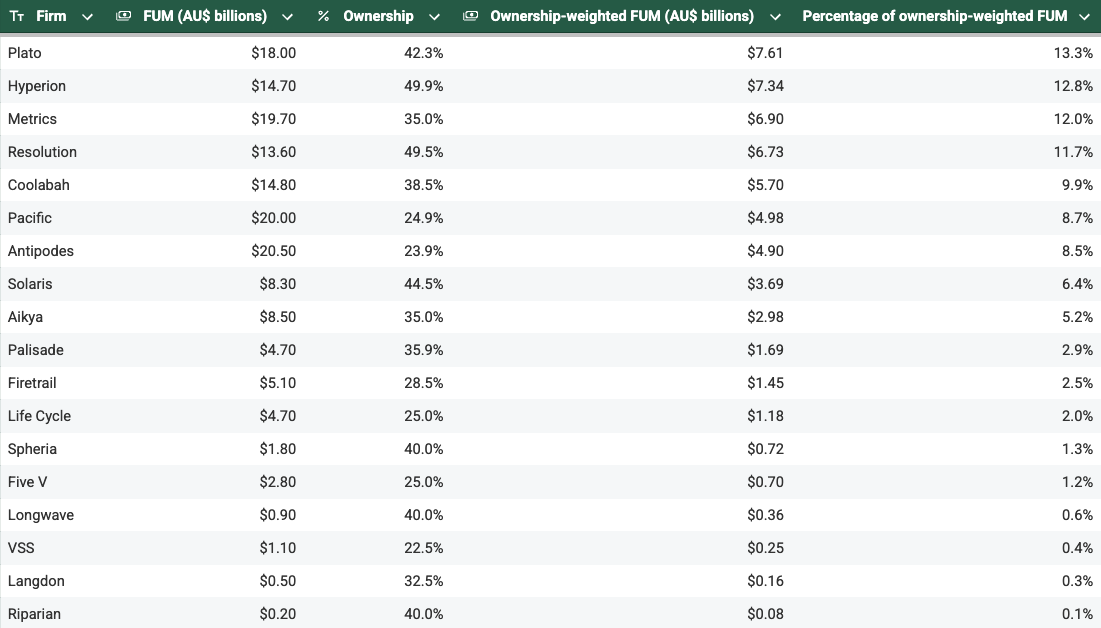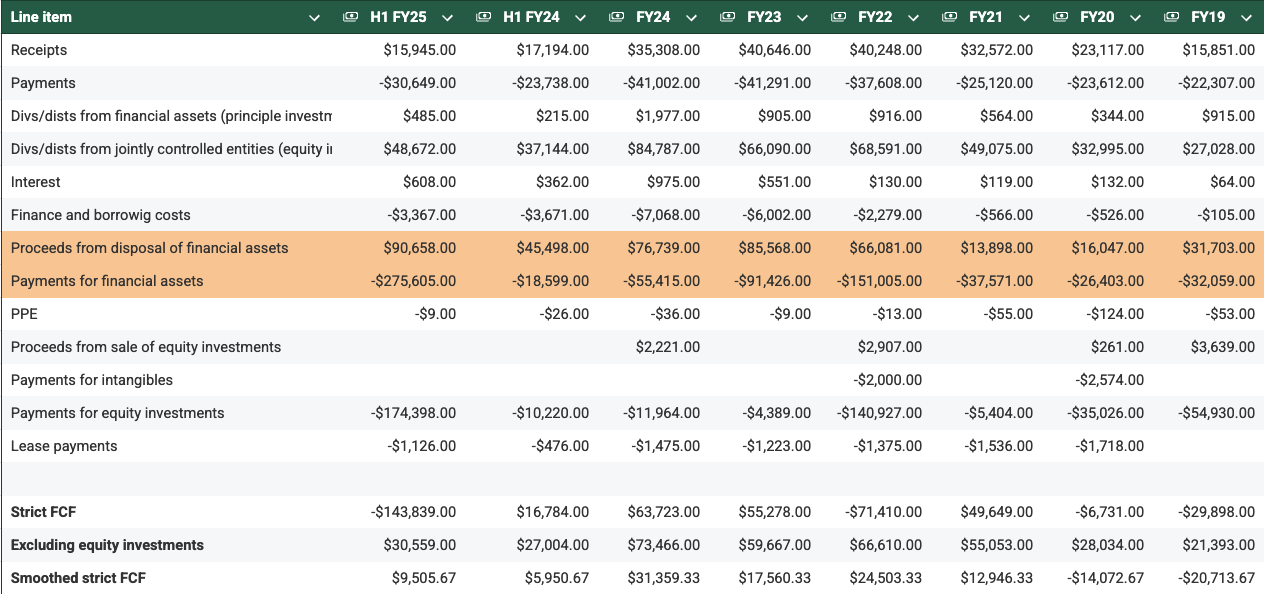New additions to the top 10: Here’s what my favourite fund managers are holding now
Each quarter, we review portfolio disclosures from a group of high-performing small-cap managers to see which stocks they’re backing. The latest data reveals some interesting changes.
Four names have dropped out of the top 10: Catapult (ASX:CAT), IPD Group (ASX:IPG), Telix Pharmaceuticals (ASX:TLX), and Zip Co (ASX:ZIP). CAT and IPG still had four managers holding them, but neither had enough "new" or "confirmed" positions to make the cut. Meanwhile, three companies – Paragon Care, Universal Store, and Guzman y Gomez – have entered my list for the first time in this dataset.
The methodology remains largely the same, though a few funds were excluded this quarter due to unavailable reports. I’ve also introduced a simple classification for holdings: “new” (not seen last quarter), “confirmed” (explicitly disclosed as held at 31 March), and “assumed” (not confirmed, but no indication of a sale). Where holdings are tied, we’ve weighted new the highest and assumed the lowest.

Stock highlights
Paragon Care (ASX: PGC)
Paragon Care, a distributor and manufacturer of medical devices and consumables, has historically grown through acquisition – most notably its merger with CH2 and the addition of Oborne. This is its first appearance in the dataset, with two new fund managers disclosing positions this quarter.
Revenue for H1 FY25 rose 28% to $1.85 billion, while net profit increased 86% to $13.2 million. Gross margin more than doubled to $163.5 million — but that still equates to just 8.8%, with net profit margins at only 0.7%.
That’s not a typo. Margins at Paragon are razor-thin. In FY24 and FY23, gross margins were just 6% and 5.9% respectively, with NPAT margins of 0.6% and 0.3%. This points to a lack of pricing power. It also leaves very little room for error – any deterioration in margin could send earnings negative. But a small margin improvement could also produce huge bottom-line gains.
Free cash flow was negative for the half, at -$53.6 million. That includes -$40.7 million in operating cash flow, with the rest coming from capex and lease repayments.
The balance sheet shows $21.7 million in cash and $248 million in total borrowings, implying net debt of around $226.5 million. That’s not ideal, though the company is in compliance with covenants and has undrawn facilities available.
One red flag: Paragon’s primary lender is ScotPac, a non-bank financier typically used by SMEs. For a business with ~$3 billion in annual revenue, that’s unusual. It may indicate either legacy debt from the CH2 merger or a lack of bank willingness to lend on attractive terms. The $200 million facility ($137 million drawn at 31 December) is currently* attracting a rate of over 7.6% or $10.4 million p.a. – more than FY24 NPAT.
The share count has ballooned in recent years, most dramatically in FY24, when it jumped from 659 million to around 1.65 billion following Paragon’s merger with CH2. While touted as a merger, CH2 shareholders received 943 million new shares and ended up owning 57% of the merged entity. It was, in all but name, a reverse takeover.
Fund managers may see value in the scale or turnaround potential (or they may simply take a different approach to stock selection). But for now, Paragon doesn’t make the cut for further investigation. If you hold the stock, or see a bull case I’ve missed, feel free to share in the comments. I’d be genuinely curious to hear it.
*30-day BBSW plus 3.9% p.a. Based on BBSW as disclosed by ASX for 20 May 2025.
Universal Store Holdings (ASX: UNI)
Universal Store is a fashion retailer and wholesaler aimed at a younger demographic. The brand has been around for years, but its rise into some fund manager portfolios is more recent. Known for its fast-moving youth apparel and in-house brands, including Perfect Stranger and Thrills (via the CTC acquisition), it operates a high-margin retail model that compares favourably with other discretionary retailers.
Two new fund managers disclosed positions this quarter. That could reflect confidence in the consumer, or in UNI’s ability to maintain margins despite a tougher trading environment. Gross margin came in at 60.6% (up 0.9% from H1 FY24) thanks to higher private label penetration and tighter discounting. Net profit fell 46% to $11.3 million, including a $13.6 million goodwill impairment relating to the CTC business – a recently acquired designer and wholesaler of youth fashion. Underlying NPAT rose 16% to $23.2 million.
Free cash flow – cash generated from operations minus capex and lease payments – for the half was ~$38 million from ~$60 million of operating cashflow. UNI ended the period with $37.7 million in cash and no bank debt. It also paid down a $15 million loan during the half and retains access to undrawn facilities.
Inventory looks well-managed, with days in inventory sitting at 57 days, down from 60 days in June 2024. Days in inventory measures how long, on average, stock is held before being sold. It's calculated by dividing average inventory by cost of goods sold (COGS), then multiplying by the number of days in the period. That’s consistent with their strategy of tight, curated stock control. Total inventory also fell slightly to $28.5 million.
CTC was a drag on group performance, with segment EBIT down 57% and wholesale sales off 16%, ultimately triggering the goodwill writedown. Make no mistake, writedowns of acquisition goodwill are real expenses, not just accounting noise. While management is optimistic about a turnaround, the lacklustre results from Thrills and Worship (two of the brands acquired through CTC) highlight just how fickle fashion can be.
On the positive side, UNI has now surpassed the earnings it achieved during the COVID-driven retail boom, something many apparel retailers have yet to do. Cost control appears solid. Store growth from here looks limited for the core Universal Store brand, but Perfect Stranger – a second retail store focused on women’s fashion – still offers some expansion upside given it has far fewer stores operating.
As a daggy Dad I’m clearly not the target demographic, but the offering strikes me as sensibly positioned overall.
If you think middle-class consumers are set for a rebound, UNI offers a clean way to play that theme. I’m not a buyer at current prices, but in the context of a tough retail landscape, the most recent results were solid.
Pinnacle Investment Management (ASX: PNI)
Pinnacle has topped this list twice, and while only one new fund added it this quarter, it remains the most widely held company in the dataset (previously tied with IPG).
FY25 earnings forecasts (per Morningstar) sit at a median of 64 cents per share. That figure looks conservative, in my view. Net flows for FY25 to 31 March totalled $5.9 billion, already ahead of all of FY24. Encouragingly, flows accelerated into Q3, with $2.2 billion of net inflows following $3.7 billion in H1.
While some investors were concerned that April’s volatility would hurt Hyperion (one of Pinnacle’s best-known equity affiliates), performance has held up well. Hyperion’s Global Growth Fund returned 4.9% for April, beating its benchmark by 6.6%. Its Small Growth Fund rose 5.6% (vs 1.8%), and even the Australian Growth Fund beat its benchmark in April. Over the past year, the global and small cap strategies are well ahead of benchmark, while the Australian strategy lags modestly.
It’s worth noting that Pinnacle’s growth isn’t dependent solely on Hyperion, or even on equities. Of the $3.7 billion in net inflows during H1, $1.4 billion came from private markets, $1.2 billion from fixed income, and $1.1 billion from listed equities and real assets.
The table below shows each of Pinnacle’s affiliates, with FUM adjusted for their ownership percentage. This gives an approximate indication of the amount of exposure PNI has to each firm’s performance.

In H1 FY2025, NPAT rose 150% vs H1 FY2024 to $75.7 million, while revenue from its own operations totalled $27.6 million, up 17%, with a profit of $74.3 million contributed from equity-accounted affiliates, up 99% vs the prior corresponding period. The company ended the period with $90.4 million in cash and $100.2 million in debt.
Pinnacle also holds $350 million worth of financial assets, which are primarily investments in the unit trusts managed by its Affiliates. Its cashflow is a little unusual due to the combination of investments in its Affiliates and their funds. I treat direct Affiliate investments as capex, while excluding fund investments. In my view, a smoothed average over several years gives the best sense of Pinnacle’s underlying free cashflow generation.

At the time of my previous article, Pinnacle shares were trading near $25. I noted that I wasn’t ready to buy but was watching for a better entry point. That came in March and April, with the share price falling below $18. I picked up stock in multiple trades at an average price of around $18. While the price has since recovered slightly, it remains materially lower than in February. If I had no position today, I’d be comfortable initiating a small position below $20, and I would still be happy to add on further weakness.
Not all buying activity shows up in quarterly portfolio disclosures. Sometimes, it’s directors themselves who give the clearest signal — by buying shares on market If you're curious which small caps have recently seen insider buying, this piece covers three worth a closer look.
Disclosure: The author of this article owns shares in PNI and will not trade shares in any of the companies discussed for at least 2 days following the publication of this article. The editor of this article, Claude Walker, does not own shares in any of the companies mentioned, and will not trade shares for at least 2 days following the publication of this article. This article is not intended to form the basis of an investment decision and is not a recommendation. Any statements that are advice under the law are general advice only. The author has not considered your investment objectives or personal situation. Any advice is authorised by Claude Walker (AR 1297632), Authorised Representative of Ethical Investment Advisers Pty Ltd (ABN 26108175819) (AFSL 276544).
2 topics
10 stocks mentioned

